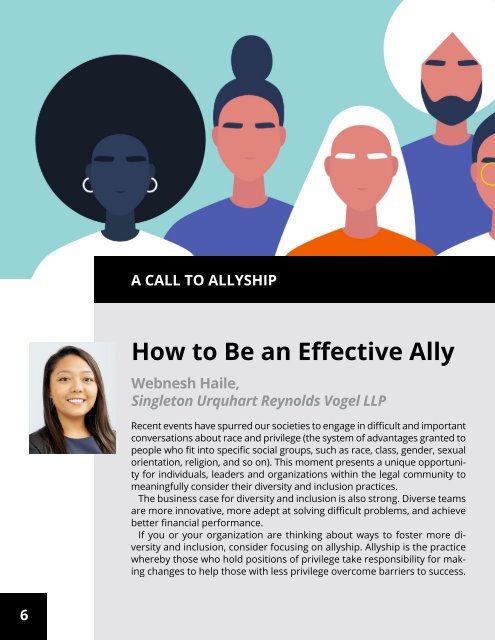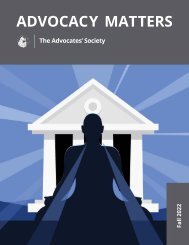Keeping Tabs - Summer 2020
Stay up-to-date on news and events from our Young Advocates' Standing Committee (YASC) with Keeping Tabs.
Stay up-to-date on news and events from our Young Advocates' Standing Committee (YASC) with Keeping Tabs.
Create successful ePaper yourself
Turn your PDF publications into a flip-book with our unique Google optimized e-Paper software.
A CALL TO ALLYSHIP<br />
How to Be an Effective Ally<br />
Webnesh Haile,<br />
Singleton Urquhart Reynolds Vogel LLP<br />
Recent events have spurred our societies to engage in difficult and important<br />
conversations about race and privilege (the system of advantages granted to<br />
people who fit into specific social groups, such as race, class, gender, sexual<br />
orientation, religion, and so on). This moment presents a unique opportunity<br />
for individuals, leaders and organizations within the legal community to<br />
meaningfully consider their diversity and inclusion practices.<br />
The business case for diversity and inclusion is also strong. Diverse teams<br />
are more innovative, more adept at solving difficult problems, and achieve<br />
better financial performance.<br />
If you or your organization are thinking about ways to foster more diversity<br />
and inclusion, consider focusing on allyship. Allyship is the practice<br />
whereby those who hold positions of privilege take responsibility for making<br />
changes to help those with less privilege overcome barriers to success.<br />
Karen Catlin, a former vice president of engineering<br />
at Macromedia and Adobe and current<br />
leadership coach, has created a helpful<br />
resource called “Better Allies”, based in part on<br />
her experiences observing the attrition of women<br />
in technology roles. Some of Catlin’s recommendations<br />
to better support underrepresented<br />
colleagues and contacts apply readily to the<br />
legal world:<br />
1. Be an ambassador for change – When helping<br />
a colleague, step back and think about systemic<br />
changes that will benefit others. Suggest<br />
new processes that will change ingrained behaviours<br />
and create a more inclusive culture,<br />
focusing on what will help, rather than what<br />
will “look good”. Examples from the legal field<br />
include the implementation of blind hiring and<br />
evaluation practices.<br />
2. Listen, believe, learn – Be open to listening<br />
to alternative perspectives from members<br />
of underrepresented groups. Be willing to be<br />
vulnerable; resist the urge to get defensive. Accept<br />
that prejudice – which includes subconscious<br />
bias – exists in our society, and in the<br />
workplace. Take responsibility for educating<br />
yourself, and taking action when you see harassment<br />
or discrimination.<br />
3. Share the load – Office “housework” is often<br />
inequitably distributed. Calling on women and/<br />
or members of underrepresented groups to<br />
perform disproportionate amounts of non-billable<br />
but necessary work may prevent them<br />
from tackling more meaningful work, or require<br />
them to work more hours in order to docket<br />
the same number of billable hours. Consider<br />
developing a rotation for tasks like scheduling<br />
meetings, engaging in student mentorship or<br />
representing the firm at diversity events, as appropriate.<br />
4. Don’t be a gatekeeper, be a door opener –<br />
Helping people from underrepresented groups<br />
achieve their goals and advance their careers is<br />
one of the most powerful things allies can do.<br />
Ask the people you manage and mentor about<br />
their goals. With permission, share them with<br />
influencers. Hand out desirable assignments<br />
equitably, and advocate fairly during performance<br />
reviews and promotion discussions.<br />
Of course, being an ally is a process. Don’t let<br />
mistakes hold you back from taking action. As<br />
a group, advocates are privileged in many respects.<br />
As such, it is our responsibility to consider<br />
whether we can and should be doing more to<br />
engage in and foster allyship as individuals and<br />
in our organizations.<br />
6 7


















